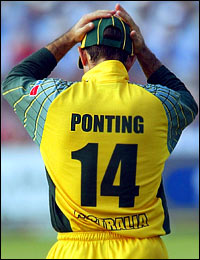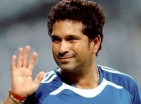The Captain’s Conundrum
Cameron Burge |
In January Ricky Ponting’s team was heavily criticised for their “win at all costs” mentality in the Sydney Test. Recently, the captain was vilified for putting compliance with a playing condition ahead of his side’s chances of winning. The media and cricketing public cannot have it both ways.
The lead sporting stories in the Sydney Morning Herald of Wednesday 12 November 2008 were as contradictory as they were instructive in demonstrating the tight rope Ponting now walks as captain.
The first piece dealt with Ponting’s response to Peter Roebuck’s strident January criticism of the Australian team, and his call for Ponting to be sacked as captain. At the time Roebuck wrote “If Cricket Australia cares a fig for the tattered reputation of our national team in our national sport, it will not for a moment longer tolerate the sort of arrogant and abrasive conduct seen from the captain and his senior players over the past few days”.
Readers will well recall the response to Australia’s win in Sydney, with newspaper polls indicating the majority of Australians thought their team tried to win at all costs, and was not sensitive enough to the traditional mores of the game. For their part, many others in the media expressed the view that Australia was not playing the game in the right spirit, with non-cricketing sporting luminaries such as Rob de Castella and John Bertrand condemning the way the team went about its business.
At the time, Mike Coward wrote in The Australian that while the players took the criticism on board, “… the survivors of the Ashes defeat in 2005 have expressed frustration at the carping they have received. They have memories of being condemned for not playing hard enough in England and feel they are damned if they do and damned if they don’t”.
Coward’s comments proved prescient in light of the happenings in Nagpur last week, and 12 November’s other back page SMH article, which was headed “I haven’t gone soft, declares Ponting”.
Put simply, within 10 months Ponting has had to defend his team from charges it played to win at all costs to the detriment of the game in Sydney, and accusations it did not push hard enough to win at Nagpur when Ponting bowled part timers instead of his quicks after tea on day four, to comply with the 90 over per day playing condition.
The problem in India was Australia’s appalling over rate, which had fallen to nine overs behind that required by the ICC’s playing conditions. Many supporters of the game have, quite rightly, pointed out that the team hierarchy’s concern with the slow over rate should have manifested itself before it reached so parlous a state. Nevertheless, once apprised of the situation the captain took steps, arguably to his own team’s detriment, to up the rate and comply with the rules of the game.
A further complicating factor was the prospect of Ponting being suspended for a second offence concerning slow over rates. Many have suggested Ponting was thinking only of himself and not the team in making the decision he did, and that if he was really concerned with the rules and spirit of the game, he would not have let the rate fall so far behind before acting. Among the critics taking this approach were former captains Ian Chappell and Allan Border, whose comments have clearly stung the current skipper as they, to him at least, appear to attack his priorities and by inference his integrity, rather than merely his tactical prowess.
Unfortunately for the “selfish captain” theory, recent history shows that Ponting has resorted to the use of part timers to remedy the slow over rate well before Nagpur. As far back as the Perth Test against India both Andrew Symonds and Michael Clarke bowled prolonged spells at a time when India was well on top. Likewise, Ponting resorted to his slower bowlers at different times in the first three marches of the recently completed series; the most notable when he and Brett Lee had an on-field altercation in Mohali about the latter’s not bowling for a full session. Little wonder the captain has previously stated the issue of over rates “Does my head in”.
Responsibility for slow over rates should and does rest with captains. Nevertheless, there are ten other players on the field who can all do their bit to assist a skipper when things get tough. The fact they usually don’t says as much about their lack of professionalism as it does that of the man appointed to lead them. But rather than launch into a missive on the over rates issue, let’s consider for a moment the predicament Ponting finds himself in.
Plainly the criticism leveled at Australia after Sydney stung the captain, who was as bemused as he was angered by it. Despite expressions to the contrary, it seems Sydney-gate has affected Ponting’s attitude and approach. In light of what was said and written after Sydney, is it really surprising Ponting baulked in Nagpur at bowling his quicks and ignoring a playing condition set down by the game’s governing body? Does it really surprise us that he baulked at an action which would be construed as yet another example of wanting to “win at all costs”?
Ponting is not perfect as a Test captain, but then who is? He appears at times to make baffling tactical decisions and his temper at times runs away with him. But he is a robust character whose batting since becoming captain has hardly suffered a jot, and he remains one of the more pugnacious characters in the game . He seems, to this writer at least, to have made efforts to restrain some of the excesses of last summer and the 2005 Ashes series; to have taken into account what those watching will make of the manner of his team’s play, rather than just its results. The fact that those who have condemned him for his tactics in Nagpur also saw fit to criticize post-Sydney is an irony which will not be lost upon him.
Part of leadership is acknowledging when mistakes have been made. Tacitly, resorting to the part-timers was an admission on Ponting’s part that he’d messed things up, that things were out of control. For bearing in mind the relevant playing condition at such a time; a time when his team was pushing for a series-levelling victory, he should be congratulated, not pilloried. For despite being rightly condemned for putting his team into the position in the first place, he properly deferred to the rules and spirit of the game by trying to redress his earlier error.
The Revelation in Nagpur had its Genesis in Sydney. Now, with upcoming series against New Zealand and South Africa, Ponting has the chance to find the balance between hard-edged, uncompromising cricket and a preparedness to play the game as it ought to be played. It’s a fine line. I for one hope he can tread it.





Leave a comment